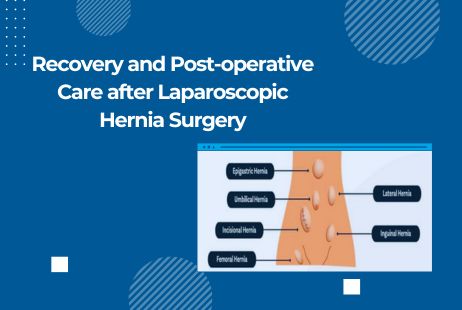Laparoscopic hernia repair is a less invasive surgery that targets hernias, involving the protrusion of organs or fatty tissue through a weakened abdominal wall.
The procedure employs a laparoscope—a slender tube equipped with a camera and light—to guide surgeons through small incisions in the abdomen.
By utilizing specialized instruments, this approach enables precise hernia repair with minimal impact on surrounding tissues. While the surgery is less invasive, ensuring proper recovery and post-operative care is crucial for successful healing.
Hernia operation recovery time
So, most patients’ first question is how long it takes to recover from hernia surgery.
Recovery time from hernia surgery varies among individuals and depends on multiple factors. Such as:
- Hernia surgery type.
- Patient overall health.
- How religiously post-operative instructions are followed.
On average, after the procedure, patients resume their normal activities around 3-4 weeks.
You should be able to return to normal activities around four weeks after the procedure.
Post-operative Care after Laparoscopic Hernia Surgery
After laparoscopic hernia repair, adhering to postoperative care instructions is crucial for a smooth recovery.
Here are some guidelines to keep in mind:
Rest and recuperation
After the procedure, rest and give your body time to recover. Expect some discomfort initially, but stick to your doctor’s recommended pain medication. Prioritize rest for a smoother recovery.
Diet and hydration
Post-surgery, maintain a light diet and stay well-hydrated with ample water to support initial healing.
Wound care
Keep your abdominal incisions from the laparoscope clean and dry to prevent infection. Follow your doctor’s instructions for dressing changes and removal.
Physical activity
For the first two weeks post-surgery, avoid heavy lifting and strenuous activity. Instead, focus on light walking and gentle stretches to promote blood flow and prevent clotting.
Follow-up appointments
Keep your follow-up appointments to monitor recovery and address any concerns or instructions your doctor provides.
Wear compression garments
Use a compression garment like a support belt as your surgeon advises to support incisions and reduce swelling. Follow their instructions on when to wear it and how to care for the garment.
Gradual return to activities
As you recover, slowly raise your activity level, beginning with light activities like walking. Avoid lifting heavy objects or straining your incisions for several weeks after surgery.
Patience
Be patient during the recovery from laparoscopic hernia repair, which may take weeks. Prioritize rest, hydration, and overall self-care for physical and mental well-being.
Monitor Bowel Movements
Watch for constipation after surgery, a common side effect of pain medication and reduced activity.
Eat a high-fiber diet, stay hydrated, and use stool softeners or laxatives as your doctor advises. Report any concerns about bowel movements to your doctor.
Follow a Healthy Diet
Maintain a healthy diet for optimal healing after surgery. Focus on fruits, vegetables, lean protein, and whole grains.
Avoid irritating foods like spicy or greasy items. Consult your doctor with any diet-related concerns.
Communicate with Your Doctor
Stay in touch with your doctor for a successful recovery. Share concerns, ask healing-related questions, and receive ongoing guidance and support.
Avoid Driving
Avoid driving for several days post-laparoscopic hernia surgery, especially while on prescription pain medication. Premature driving can be unsafe and hinder your recovery.
Avoid Sexual Activity
Refrain from sexual activity for a few days post-laparoscopic hernia surgery or until your doctor approves its resumption.
Why should you opt for Laparoscopic Hernia Surgery Dubai?
Some common reasons include:
- Safe and secure surgical process using Minimally invasive procedure.
- Reduced post-surgery pain and discomfort with fewer pain medications.
- Short recovery time & Quick return to work and normal activities.
- Fewer post-operative complications.
- Excellent cosmetic results due to smaller incisions.
- Early detection and repair of less visible hernias, minimizing the need for future surgeries.
Choose Dr Girish Juneja for your Laparoscopic Hernia Surgery in Dubai
Dr. Girish Juneja, a highly experienced surgeon with over 20 years of global patient care, specializes in advanced hernia surgeries.
He employs the latest techniques to ensure optimal results and safety. In 2017, he received the first Surgeon of Excellence Award for bariatric surgery in Dubai.
With 30+ years in laparoscopic/general surgery, Dr. Girish leads bariatric & laparoscopic services at Al Zahra Hospital. He’s certified as a Surgeon of Excellence for bariatric and metabolic surgery by IFSO (EAC-BS).
Book an appointment now.

